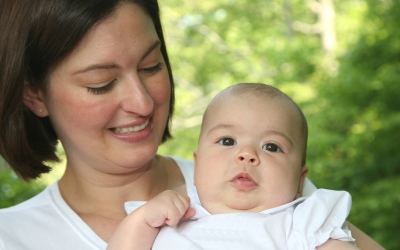You may think that your baby’s weight will only have an impact on his physical health, but it may influence other aspects of his wellbeing. This is according to new Australian research, which found that the amount of weight your baby gains during his first month could determine his cognitive wellness. The study, which was based on 13,800 children who were born at full-term, found that children who – in the first month of life – gain more weight, and whose heads grow quickly, tend to have a higher IQ when they start school.
The researchers at the University of Adelaide, in Australia, noted that babies who gained another 40% of their birth weight in the first four weeks had an IQ 1.5 points higher than those who only put on 15% of their birth weight. Moreover, by the age of six, the children who experienced the biggest growth in head circumference also had the highest IQs. Lead author of the study, Dr Lisa Smithers, explained, ‘Head circumference is an indicator of brain volume, so a greater increase in head circumference in a new born baby suggests more rapid brain growth.
According to Dr Smithers, ‘Overall, new born children who grew faster in the first four weeks had higher IQ scores later in life. Those children who gained the most weight scored especially high on verbal IQ at age six. This may be because the neural structures for verbal IQ develop earlier in life, which means the rapid weight gain during that neonatal period could be having a direct cognitive benefit for the child.’
Up until now, studies have shown a link between early postnatal diet and IQ. However, this study is the first of its kind, as it focuses on the IQ benefits of rapid weight gain in the first month of life. Smithers argued that this study adds further weight to the need for successful feeding of new born babies. She commented, ‘We know that many mothers have difficulty establishing breastfeeding in the first weeks of their baby’s life. The findings of our study suggest that if infants are having feeding problems, there needs to be early intervention in the management of that feeding.’
